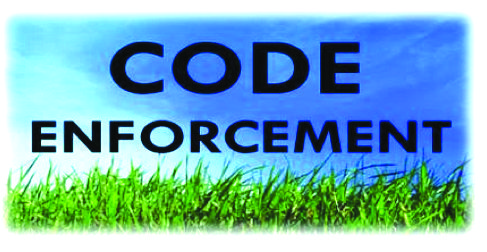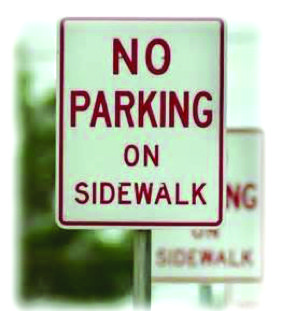What is Code Enforcement?
Code Enforcement is the prevention, detection, investigation and enforcement of violations of statutes or ordinances regulating public health, safety, and welfare, public works, business activities and consumer protection, building standards, land-use, or municipal affairs.”
What is a Code Enforcement Officer?
A Code Enforcement Officer is a sworn or non-sworn inspector, officer or investigator, employed by a city, or county, or city and county, who possesses specialized training in, and whose primary duties are the prevention, detection, investigation, and enforcement of violations of laws regulating public nuisance, public health, safety, and welfare, public works, business activities and consumer protection, building standards, land-use, or municipal affairs (http://www.caceo.us/?10).
Code enforcement, sometimes encompassing law enforcement, is the act of enforcing a set of rules, principles, or laws (especially written ones) and ensuring observance of a system of norms or customs.
Did You Know?
On Swale Parking
According to Sec. 42-601 (g) Off-Street Parking – in one-family detached dwelling residential zoning districts, the temporary parking of operable, currently licensed private passenger vehicles shall be permitted in the swale area of rights-of-way 60 feet or less in width which are not designated as a collector or arterial or non-traffic way collector roads. All other use of public and private property such as but not limited to landscaped areas of public or private property for off- street parking is prohibited. Residents or property owners who park or store vehicles in violation of this ordinance are subject to code enforcement fines and possible removal of such vehicles at the owner’s expense when parked upon public or private property where the public has a right to travel by motor vehicle.
Illegally Parked, Stopped, or Standing Vehicles
Sec. 38-27. – Use of Public Property – swale area, public right of way, roadways, and streets. Notice on illegally parked vehicles. Whenever any vehicle, without driver, is found to be parked, stopped or standing in violation of any of the provisions of this article, an enforcement officer shall conspicuously affix to such a vehicle a written citation on an appropriate form. This section shall not be construed to prohibit the issuance of a citation in any other appropriate circumstance; and an enforcement officer shall also have the authority to issue a citation to the driver of a vehicle that is parked, standing or stopped in violation of this article. The term “citation” shall include a notice of violation and any other written notification of a violation of this article issued by an enforcement officer.
Sec. 38-33. – Parking not to obstruct traffic. A parked vehicle shall not interfere with the free and normal use of the street.
Sec. 38-34. – Stopping, standing or parking in alleys.
(a) No person shall stop, stand or park a vehicle within an alley in a business district, except for the expeditious loading or unloading of materials, and in no event for a period of more than 20 minutes, and no person shall stop, stand or park a vehicle in any other alley in such a manner, or under such conditions as to leave available less than ten feet of the width of the roadway for the free movement of vehicular traffic.
(b) No person shall stop, stand or park a vehicle within an alley in such position as to block the driveway or entrance to any abutting property.
Sec. 38-35. – Stopping, standing, or parking on sidewalks. The prohibition of F.S. § 316.1945(1) (a) 2, as may be amended, is hereby adopted and incorporated herein. No person shall stop, stand, or park a vehicle on a sidewalk, except when necessary to avoid conflict with other traffic, or in compliance with law or the directions of a police officer or official traffic control device.
Sec. 38-36. – Vehicles for sale – No person shall park a motor vehicle for a continuous period in excess of 24 hours, after written notice, upon a public street or highway, upon a public parking lot, upon other public property, or upon private property where the public has the right to travel by motor vehicle, for the principal purpose of displaying the motor vehicle for sale, hire, or rental unless the display of such motor vehicle is specifically authorized on such property by municipal or county regulation and the person is licensed as a motor vehicle dealer in accordance with F.S. § 320.27, and the person is in compliance with all municipal or county licensing regulations.
Sec. 38-38. – Parking for certain purposes prohibited.
No person shall park a vehicle upon any public right-of-way for the purpose of:
(1) Displaying such vehicle for sale;
(2) Washing, greasing, or repairing such vehicle, except repairs necessitated by emergency;
(3) Displaying advertising;
(4) Selling merchandise from such vehicle except in a duly established marketplace, or when so authorized or licensed under the ordinances of the city;
(5) Storage or as junk-age or dead storage.
Sec. 38-22. – Authority; enforcement. Pursuant to F.S. § 316.008, the City Commission may make reasonable rules and regulations relating to the parking, standing and stopping of motor vehicles on public roads, rights-of-way, or other public lands in the corporate boundaries of the city. It shall be the duty of the city’s law enforcement agency (i.e., county sheriff’s department; deputy sheriffs; members of the city police department; and all other applicable law enforcement officers) to enforce such rules and regulations to issue citations to any person violating the provisions of this article.









